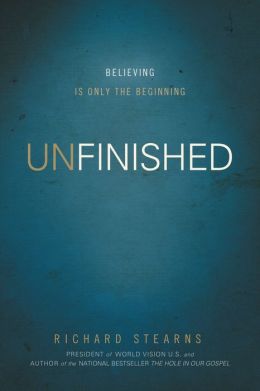The Book
Unfinished: Believeing is only the beginningBy: Richard Stearns
In mid-April I received an email that made my day. World Vision's blogging team reached out to me asking if I wanted a free copy of Richard Stearns' new book "Unfinished" in exchange for a review. They noticed that I had written a review of "The Hole in our Gospel" and contacted me through this Holy Things blog.
I immediately pounced on this opportunity since I enjoyed the message of Richard Stearns' first book and since I review everything I read regardless of whether the publisher wants me to. I was pleased to receive the book soon after responding to the email. However, due to my class schedule and other things on my plate, I was unable to finish the book until today. (Hence, my review...)
Technical Merit
Richard Stearns really grew as an author from his first work to this one. His writing is much more polished in this piece and I give him a 4 out of 5 based only on his diction and ability to piece together an argument. This is a more manageable volume (220 pages including the Afterword) that is focused less on statistical information and more on anecdotes and exhortation.Note that this book is also littered with scripture references that back Richard's claims. He presents a balanced view of scripture that does not lean on works for salvation, though clearly does not leave us the option of holding on to a dead faith.
Review
The main thesis of this book is simple, "God has invited you to join him in changing the world." (pg. 130) The great commission is a non-negotiable part of being Christ's follower. We are either taking this commission seriously and actively pursuing His interests or we are directly disobeying Him.God's work in this world is still unfinished. God still wants to influence this world with his love through his people. Stearns stated, "God's deepest desire is not that we would help the poor... God's deepest desire is that we would love the poor; for if we love them, we will surely help them." (pg. 76) We cannot go into the world and preach a cold gospel. We cannot tell people that God loves them and not lift a finger to help people in need. Who would respond to that kind of gospel? If Christ was all about love and sacrifice (especially towards the poor, the widow and the orphan) then we should follow in His footsteps.
Christ came to begin a work, and He plans to complete it through us. Richard Stearns argues that the Body of Christ metaphor means that Christ literally wants to influence this world through his Church. He is the head, we are the members. He is giving direction and supplying power through His Holy Spirit, we need to respond and be His expression of love. Christ's work is unfinished, He seeks to finish the work in us and through us.
Takeaway
The section that impacted me most was in chapter 5 when Richard Stearns references Scot McKnight regarding the difference between a disciple and a decider. I believe Stearns' argument for the entire book rests on this distinction. "Deciders just believe the right things; disciples seek to do the right things." (pg. 58)Too often, we want to make deciders of people—we want them to pray a prayer and buy some fire insurance for hell. Too often, I find my life reflects the life of a decider; I believe the right things, I have the intellectual acumen to digest theology and so on. The problem is, faith has not moved from the mind to the feet. Faith has not moved from the heart to the hands. The decision is not the finish, it is only the beginning.
"The good news of the gospel is not that I can enter God's kingdom when I die; it is that Christ's death and resurrection opens the kingdom of God to me now." (Pg. 60) Let us grow deeper in a faith that acts out and does not just sit around. Let us be disciples rather than just deciders.
Richard's challenge is a strong one, particularly as the book concludes. He does not mince his words. If you choose to read this book, which I heartily recommend, you will likely be convicted of your failure. Thankfully, Stearns also reminds us that it is never too late to obey God's calling.


